Stephen J. Matlock's Blog, page 52
December 15, 2012
A Poem for Advent
America 2012
Twenty children were shot
Charlotte Bacon, 6
and six adults in one of
Daniel Barden, 7
the greatest tragedies
Olivia Engel, 6
in American history.
Josephine Gay, 7
Unfortunately, it was
Ana M. Marquez-Greene, 6
not the greatest tragedy,
Dylan Hockley, 6
for we have had mass
Madeleine F. Hsu, 6
shootings in Columbine
Catherine V. Hubbard, 6
and Virginia Tech and
Chase Kowalski, 7
Aurora and Portland and…
Jesse Lewis, 6
The list goes on and on,
James Mattioli, 6
and while we are sometimes
Grace McDonnell, 7
speechless and sometimes
Emilie Parker, 6
saddened, it is never enough
Jack Pinto, 6
to move us to take action.
Noah Pozner, 6
We think we are powerless
Caroline Previdi, 6
against guns, the gun lobby,
Jessica Rekos, 6
and people who depend
Aviele Richman, 6
upon their guns to protect
Benjamin Wheeler, 6
them from fear and pain.
Allison N. Wyatt, 6
But maybe, just maybe,
Dawn Hochsprung, 47
this list of dead kindergartners
Rachel Davino, 29
will be enough to move us
Anne Marie Murphy, 52
to stop this endless
Lauren Rousseau, 30
violence. It is within our
Mary Sherlach, 56
power to do so.
Victoria Soto, 27
If we want.
Words and Actions
 In my reading group we’ve been discussing Thomas Jefferson, the man who scribed the Declaration of Independence, became the second President of the United States, built a beautiful home in Monticello, supplied the Library of Congress with its books, helped to found the University of Virginia—and who owned a few hundred slaves, even while President, slaves he never freed during his lifetime and would not allow to be freed even though his friend and compatriot Tadeusz Kościuszko offered him the money to do so.
In my reading group we’ve been discussing Thomas Jefferson, the man who scribed the Declaration of Independence, became the second President of the United States, built a beautiful home in Monticello, supplied the Library of Congress with its books, helped to found the University of Virginia—and who owned a few hundred slaves, even while President, slaves he never freed during his lifetime and would not allow to be freed even though his friend and compatriot Tadeusz Kościuszko offered him the money to do so.
Jefferson was a great man, but a deeply flawed man, who used the labor of slaves to fund his patrician ways, and who increased his debt load to such a level that he sold his own slaves to continue his life of ease. 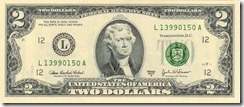
He also wrote the following:
There must doubtless be an unhappy influence on the manners of our people produced by the existence of slavery among us. The whole commerce between master and slave is a perpetual exercise of the most boisterous passions, the most unremitting despotism on the one part, and degrading submissions on the other.
Our children see this, and learn to imitate it; for man is an imitative animal. This quality is the germ of all education in him. From his cradle to his grave he is learning to do what he sees others do. If a parent could find no motive either in his philanthropy or his self-love, for restraining the intemperance of passion towards his slave, it should always be a sufficient one that his child is present. But generally it is not sufficient. The parent storms, the child looks on, catches the lineaments of wrath, puts on the same airs in the circle of smaller slaves, gives a loose to his worst of passions, and thus nursed, educated, and daily exercised in tyranny, cannot but be stamped by it with odious peculiarities. The man must be a prodigy who can retain his manners and morals undepraved by such circumstances.
And with what execration should the statesman be loaded, who permitting one half the citizens thus to trample on the rights of the other, transforms those into despots, and these into enemies, destroys the morals of the one part, and the amor patriae of the other. For if a slave can have a country in this world, it must be any other in preference to that in which he is born to live and labour for another: in which he must lock up the faculties of his nature, contribute as far as depends on his individual endeavours to the evanishment of the human race, or entail his own miserable condition on the endless generations proceeding from him.
With the morals of the people, their industry also is destroyed. For in a warm climate, no man will labour for himself who can make another labour for him. This is so true, that of the proprietors of slaves a very small proportion indeed are ever seen to labour. And can the liberties of a nation be thought secure when we have removed their only firm basis, a conviction in the minds of the people that these liberties are of the gift of God? That they are not to be violated but with his wrath?
Indeed I tremble for my country when i reflect that God is just: that His justice cannot sleep for ever: that considering numbers, nature and natural means only, a revolution of the wheel of fortune, an exchange of situation, is among possible events: that it may become probable by supernatural interference! The Almighty has no attribute which can take side with us in such a contest. — But it is impossible to be temperate and to pursue this subject through the various considerations of policy, of morals, of history natural and civil. We must be contented to hope they will force their way into every one’s mind. I think a change already perceptible, since the origin of the present revolution.
The spirit of the master is abating, that of the slave rising from the dust, his condition mollifying, the way I hope preparing, under the auspices of heaven, for a total emancipation, and that this is disposed, in the order of events, to be with the consent of the masters, rather than by their extirpation.
We look at Jefferson now and think “How could a man who saw that slavery was a monstrous injustice and a perversion of liberty continue to own and abuse hundreds of human beings?” 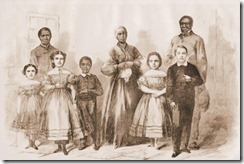
I have no easy answer. I suspect Jefferson knew it was deeply wrong and that a just God would judge him, but I also believe that Jefferson was trapped by his own position in society, his wealth, his reputation, and his desire to live an untroubled life, no matter the people who had to be destroyed to do so.
He lived the life of a hypocrite, and all his fine words and good deeds are, when matched against his actions of owning slaves, nothing but a façade of a gentleman. In essence he was not a good man, but an abusive one.
He did not do what was right even though he could do so and had the means to do so. What he lacked was not opportunity or ability, but will: he did not want to free his slaves and do justice.
It’s easy to look at that and to be ashamed for him. Such an intelligent man, such wonderful words, such awful practices. How could he not do the right thing when the opportunity was there? What a tool. What a hypocrite.
His entry in the hall of the founders of the U.S. has an asterisk next to it: Proclaimer and defender of liberty; slave-owner. That asterisk will never go away.
 Frankly, we face the same thing today. We have incredible opportunities today to do the right thing. It’s not because we are powerless to change what’s wrong in our society. It’s not that we do not have levers to change things. It is because we do not want to do the hard work required to change things. We do not want our words of freedom and justice and liberty to mean anything if it will inconvenience us, cause us to lose our friends, lead to a crimping of our lifestyle. Our children and future generations will look at us and ask: How could they not have done the right thing, when it was within their power to do so? Why did they stop with only good words and fine sentiments? Why did they not take the next steps and act?
Frankly, we face the same thing today. We have incredible opportunities today to do the right thing. It’s not because we are powerless to change what’s wrong in our society. It’s not that we do not have levers to change things. It is because we do not want to do the hard work required to change things. We do not want our words of freedom and justice and liberty to mean anything if it will inconvenience us, cause us to lose our friends, lead to a crimping of our lifestyle. Our children and future generations will look at us and ask: How could they not have done the right thing, when it was within their power to do so? Why did they stop with only good words and fine sentiments? Why did they not take the next steps and act? 
I don’t know how to fix that for you, personally. You’ll have to figure out if you want your words and your preaching to mean anything to others. Me, I’m trying very hard to re-think what I truly believe, and re-evaluate my actions. I do not know what this means in my actions. I do know that just talking isn’t enough. Just writing isn’t enough. Just petitioning and arguing and preaching isn’t enough.
 I don’t want to have an asterisk next to my name after I’m gone.
I don’t want to have an asterisk next to my name after I’m gone.
December 2, 2012
With Us and For Us
 Advent maybe means the arrival of the baby king and our anticipation thereof, but I think for me Advent means that yet another holiday season is about to bear down upon me. It is the whirlwind between Thanksgiving, which is famous for eating, and New Year’s Day, which is famous for (ahem) drinking. It is Santa Claus and trees and reindeer and sleighs and elves and giant furry monsters and nutcrackers dancing. It is the constant swirl of activity and lights and smells and the earnest pleading for me to “Have a Merry Christmas.” It’s the season where I’m told above all else to “enjoy” myself. So in the moments when I’m not enjoying myself, I feel a bit guilty. We are always told, it seems, to be ready for Christmas and yet we never seem to arrive at Christmas.
Advent maybe means the arrival of the baby king and our anticipation thereof, but I think for me Advent means that yet another holiday season is about to bear down upon me. It is the whirlwind between Thanksgiving, which is famous for eating, and New Year’s Day, which is famous for (ahem) drinking. It is Santa Claus and trees and reindeer and sleighs and elves and giant furry monsters and nutcrackers dancing. It is the constant swirl of activity and lights and smells and the earnest pleading for me to “Have a Merry Christmas.” It’s the season where I’m told above all else to “enjoy” myself. So in the moments when I’m not enjoying myself, I feel a bit guilty. We are always told, it seems, to be ready for Christmas and yet we never seem to arrive at Christmas.
It’s as if we get prepared in Advent for something that doesn’t actually exist and that we can never experience. It is a waiting for something that, when it arrives, we don’t recognize it.
And maybe we really don’t want what Christmas brings us. Oh, I understand that Christmas is associated with giving, and I have no issue with that. You can be as simple or as splurging as you want, and it’s not something I worry about. And Christmas is associated with community and family and celebrations, and those are all OK.
But the actual Christmas of Christmas—what is that which we are waiting for?
It almost seems anticlimactic when it arrives, when we find out what it is. Christmas is about the arrival of a baby. Not even a holiday celebrated in the early times—the believers mostly talked about Jesus’ life and death and resurrection, not his birth. That was almost a given, that God came to earth to take on our form. (I do hope you realize that before Christmas God and humanity were never united; after Christmas God became permanently entwined with who we are. It’s really quite unique.) But later, as believers thought about it, they came to the conclusion that we could remember the birth of Jesus with as much celebration as we do remember the death and subsequent resurrection of Jesus.
Christmas gives meaning to Easter. The birth of God as a man here on Earth set up the whole journey of God taking up a cross, dying in his body, and being brought back to life.
We think about Christmas as if it has to be more important than it feels to us—as if we should make some feelings occur inside us. So when I’m told these amazing things, I feel like I should be more impressed, somehow, and that I should react more strongly.
But—this isn’t what Christmas is about. It’s not about making myself feel something. It’s about simply remembering what happened, thinking about it, and then trying to figure out what it means to me.
If God became man, then he’s like me in how he experiences life. If Jesus cut his finger when a knife blade slipped while making furniture—then he experienced the same pain I do. (And as he was “tempted in all ways except without sin,” he felt the same urge I do to calm my nerves by shouting certain words—but with Jesus he might have been tempted to call out “Me, Me!” But I digress…)
He had to be fully and completely human. All the same restrictions and misunderstandings. All the same failed relationships and hopes. All the same disappointments with people, all the same good advice handed out to people who never, ever listened. All the same frustrations and challenges and joys and even the feeling that happiness would always pass away.
So Christmas isn’t just about a baby in a crib. It isn’t just about kings and gold and angels and songs. That’s just the celebration of the actual birth.
Christmas is about God coming down and becoming someone just like us. Someone who is God-sized and man-sized. Someone who retained all his love and mercy and hope, and yet became a man limited by his body and his surroundings.
And Advent can then go from being something I work myself up to feel something about to the wonderful assurance of this reminder that yes, God understands me because he once came down from heaven.
God is not only for us, he is with us.
November 14, 2012
Free book giveaway
Another chance to win a free book – which happens to be my book!
http://www.goodreads.com/giveaway/show/37523-stars-in-the-texas-sky
November 4, 2012
Losing My Religion–Pt. 7
Monty spoke this morning about the problem of God—he is unseen and unknowable and mostly fearful. He used the passage from the Letter to the Hebrews discussing the awful majesty of God expressed in the interaction of God with Moses at Mt. Sinai. When God met Moses, there were fearful results if God’s rules were broken—death for touching the mountain, for example. It was a time of thunder and lightning and shaking earth.
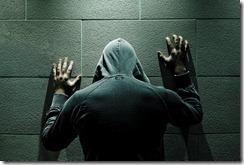 That is the God many people think of when they think of God. He’s in heaven above, he’s quite powerful—and boy, is he mad. All the time, it seems. We’re always doing wrong things, and if anyone deserves a bolt from the blue to strike us dead, it’s us.
That is the God many people think of when they think of God. He’s in heaven above, he’s quite powerful—and boy, is he mad. All the time, it seems. We’re always doing wrong things, and if anyone deserves a bolt from the blue to strike us dead, it’s us.
There’s a contrast of the God expressed elsewhere, at Mt. Calvary. The God who came down from heaven, was made man, and for us and our salvation gave his life on the cross.
That’s the God we’re told about at church; if we’re lucky we pay attention to it, but mostly we revert to the God of Mt. Sinai. Because, you see, now that God has given his son and we’re all copasetic with him, we should be even more obedient and good. We have somehow a greater responsibility and urgency to behave and to earn out such a great salvation.
I cannot figure it out, really, why the God of Mt. Sinai always gets the media attention, when for believers we have a better option.
We really want to think that we’re building up a “good pile” (to quote Monty) that, when we get to heaven, God will finally say “OK, good enough,” and let us in.
I think it stems from this: that we really don’t think we have a good enough pile, that we still have a lot in our bad pile, and if we face the truth about ourselves, we still—even as believers, even as obedient, good, kind people—fall and fail and mess-up. We still get angry, lie, cheat, steal, break off relationships and judge people. We still do just about everything we did before we became followers of Jesus, and somehow we have to get rid of that sense of guilt.
And the way we do it is to push away that big pile of bad things, claim that it’s all “forgiven,” claim that it’s in the past—but we know that it’s still there, and needs to be dealt with.
We deal with it by running back to Mt. Sinai to the God who judges and is mad, because we’re still mad—at ourselves and our actions. We deserve that God, still.
I think the problem is we simply cannot believe that we are truly restored and forgiven and accepted. That when we come into the presence of God because Jesus gave his life for us, that we are in the presence, unconditionally. Not because he pretends not to notice the big pile of bad stuff. But because that whole issue is done with.
We can be in the presence of the God of Mt. Calvary where we finally let go—really let go—of all those piles of stuff, the good stuff and the bad stuff, and we just live in the accepting presence of God.
October 28, 2012
Why I Left the Republican Party
An individual comprises many aspects. He has his various tastes, his desires, his values, his wants, his talents, his achievements, his dreams, his future, as well as the self-identification he places upon himself to say “This is me.”
We are comfortable in thinking we know who we are, especially as we get older. We settle down into our lives, confident we know how to do certain predictable things and achieve predictable results. We are confident that when we speak the people who respect us will listen to us, and that’s all that counts. We know that we have a settled place in our society, and that we fit in. After a certain point in our lives, we really don’t change much in our position. Our attitudes and expectations are set. We don’t even think of it anymore, but at one time in our lives we struggled to figure out who we were and what we could do; now that we’ve arrived, so to speak, that struggle for self-identity is over.
In fact, if we’re not careful, our comfortable middle-age may gradually lead us into a life that no longer reflects the idealism of our youth. Where once we were afire with passion and righteousness, we can become placid and consumed with self-righteousness.
This happens to most of us, I think, and it happened to me. Realizing this is taking a lot of effort, and it’s not a process that is finished.
This same thing happens, I believe, to political parties, which comprise various factions and values all striving to become an identifiable whole. In America, there have consistently been only two major political parties, no matter their names, and no matter their values. There are two general places that the they coalesce around, and while those places shift in time, they tend to be based on economic identities with some attention to other values, including political values.
The coalescing is always going on, and while parties can become more fixed in their viewpoints on some issues, the rise of new generations and the passing of old generations tends to allow parties to gradually shift their positions over time without even noticing it. Like people who age who gradually shift away from their youthful principles, parties can age and shift away; it takes a rejuvenation and a regenerated sense of purpose for parties to recapture the flame of their youth.
Now, this leads me to my departure from the Republican Party. (Trust me, I’ll tie these things together.)
I grew up in Southern California in the 50s and 60s, and saw and experienced the conflagration of general American principles during the time of great upheaval. I was transfixed by the death of JFK and the onscreen murder of Oswald (which I saw directly), and while I was only mildly upset at the death of Dr. King (because I was not capable of comprehending his place in American history), I was shocked at the death of RFK just a few weeks later. It seemed America was falling apart—or maybe was going to explode. There were increasing numbers of riots in American cities. Kids on campuses were attempting to take over their schools against all reason (they weren’t the owners of the schools; what right did they have to do so?)
Yes, I was impressionable—I was only 14, but based upon what I saw and felt, the civil society I believed in was falling apart in ways that didn’t make sense. I felt an inclination to support the values that gave me comfort—the values of God and country, of a return to normalcy and stability. It was during the 60s, and the President was experiencing more and more of a credibility gap—the famous inability of Lyndon Johnson to tell the truth.
During the ramp-up to the 1968 election, I followed the general debates closely—who was talking about what would most bring about stability in America. It seemed to me that the consensus around the Democratic Party was that the Vietnam conflict was a mistake, and that we should withdraw American troops because we had failed in our efforts to achieve an American culture of democracy in Vietnam—with all the efforts of America, the Vietnam peninsula was growing less democratic, not more. And there was, of course, the fear that the fall of Vietnam would lead to the fall of Cambodia, Laos, Thailand, Burma—the whole set of dominoes that would go down if Vietnam were to fall to the Communists.
In the America I lived in, the world was coming apart. There were daily reminders of campus violence, sit-ins, demonstrations, tear gas being used to control students who could not be controlled. To my mind, it appeared as if kids didn’t understand how grateful they should be for the blessings of liberty and freedom, and that they were taking advantage of the American college system. How could they think that they were the ones who could determine whether a college was open or closed, or even determine the classes that could be taught?
I will have to say that I didn’t pay much attention to the civil rights struggle going on at the time, which is both a matter of awareness and a matter of valuation—I didn’t consider the struggles of the American underclass in any way, and didn’t comprehend how much the unseen struggled to be seen and heard.
It was tumultuous, and it appeared that America truly might just fall apart.
In this mix of chaos came a man who had been a Senator, a Vice-President, a Presidential and a Gubernatorial candidate, and he spoke words that he would bring peace and safety and calm. It was Richard Nixon, and he appeared to be the statesman of America and the world.
I could not vote for him, of course, as I was not 18 at the time of the election, but I supported him over Hubert Humphrey. And I was glad to see that in a very close election Mr. Nixon was elected. And at that time I made the commitment to follow the Republican Party, because I felt it was the party of peace and stability and godliness and honor and flag and country.
Richard Nixon, of course, had to resign in disgrace for his manipulation of the 1972 election, but I stayed faithful to the party. I voted for Ford because he was a good man who pardoned Nixon to remove the problem of trying a former president for crimes committed in office. I voted for Reagan twice, because of course the Republican Party was going to restore American greatness, and I voted for Bush I in 1988 because while he didn’t appear to be Reaganesque, he was Reagan’s VP and he deserved to win. Then I voted for Bush I again in 1992 against Clinton and Perot, and for Dole in 1996 even though, honestly, Dole was a terrible candidate—someone who just walked into the candidacy because it was his turn.
In 2000 and 2004 I voted for Bush II because he appeared to be an honest, upright man, and in 2008 I voted for McCain even though I had sworn I’d never vote for him, because, well, he was the Republican.
But I have to say, there was a rising sense of discomfort over the direction of the Republican Party, and I had been going through personal struggles about my own changes and my own understanding of my values. I had become a Christian in the early 70s, and my Christianity got identified with the Republican Party—they were the party of God, after all, and the Democrats weren’t.
But my Christianity really wasn’t identified with the Republican Party over all—what my religion valued were people—the hurt and lonely and lost, the marginalized and the forgotten, the ones who were broken and wounded. The lost and the forgotten and the sinners really weren’t the people the Republicans valued—or even that the church valued. the people and the church valued were the good and the godly and the just and the upright—the ones who lived the upright, moral, American life, the ones who did what was expected to keep the economy moving and the church thriving. If you wanted to fit in to the American and the church that I knew, it was up to you to make the changes in your own life. You needed to come to church, you needed to do the work to be a hard worker and an honest person to be a Republican, you scrimped and saved and exhausted yourself in order to provide for your family because, by God, your government should not in any way assist you in your life and your struggles.
It seemed quite weird to me to hear sermon after sermon talking about the need for a life of integrity and honesty and love, and yet to see how the church identified itself with the Republican Party, which was not about honesty (witness Nixon) and love (witness the hysteria of any attempt to have a government which reflected Christian social values such as mercy and justice and welfare. Instead, the government values the Christian church promoted were values such as resistance to changes in civil values such as the right of women to be full and equal citizens, to suppress the rights of black Americans to be full and equal citizens, to suppress the rights of anyone in America who did not fit into the image of the straight white Christian. There was so much that didn’t fit in to what I heard preached, and yet the church overall proclaimed that the Republican Party was the party of God because, for one, the Republican Party claimed to be against the right to abortion, and the Republican Party also became identified as the party against the rights of non-straight people to have equal rights.
It was crazy-making in my head. How could I be a believer in a merciful Jesus and be identified with a party that was so utterly cruel to the downtrodden? How could I be a follower of Jesus when the party I identified with was literally bloodthirsty with regards to the death penalty? How could I be someone who said “I am a model of the accepting and loving Christ” when my party excluded so many people from full civil rights?
I could not maintain it, but I spent many years trying to make it work. I tried the excuse that the church and the state were separate, but I could not do it—the values I carried as a believer were human values, and they were life-affirming. I tried the excuse that the church was a kingdom not of this world, and that I should render to Caesar the things of Caesar, but I was actually interpolating my church values into the civil government of America. The America I was trying to support was more and more simply an extension of an extremely conservative social and religious structure.
I was becoming someone who was letting my church enforce its religious values upon citizens in American who did not share those values. There is nothing in the Bible that supports the rights of believers to own the government or to determine what the government should do except that the government should enforce justice. But justice in the American system was becoming more and more a system that supported the powerful and the rich and the well-connected and the self-rewarded. It was ignoring the cries of the dispossessed—the very people Jesus came to save and serve.
My government and my church were becoming entwined, and it was not good.
And I was a Republican through all this. I believed in the party, in its goodness and in its principles. The Republican Party was the only party that would do the right thing.
But really, it became apparent that the government was becoming more and more wildly unChristian in its support for continuous war with a convenient enemy, in its disinterest in the plight of Americans caught in the cycle of poverty, and it its completely unconscionable support of the wealthy in their continuous efforts to achieve wealth and control of America and the world.
If the kingdom of Christ is not of this world, then it appears to be wrong to support the people who are attempting to gain control of this world.
The Republican Party simply was the party of greed and dishonor and unfairness. It was the party that wanted to continue ignoring the awful plight of the poor and the oppressed in America. It was the party that simply supported only the presentable.
I finally could no longer support the Republican Party. I could no longer suppress my own religious values, and my own sense of the kingship of Jesus over my life and over this world. He was the king who demanded justice and fairness and attention to the people who cried out for help. He was the king who bent down to save the needy. He was the king who comfortable being born in a feeding trough, in living in a hick town, in living in poverty, in dying with few few friends. He was not someone who loved the spotlight or who wanted to associate with the powerful as a shortcut to accomplishment.
I could not associate with this party any longer.
And the break was made complete when the Republican Party firmly associated itself with the craziness of the birther movement. President Obama is a flawed man and a flawed President. Every President is so flawed. But President Obama is also someone who has the unique property of being black in America. He is a representative and a member of the class of people in America who have historically been ignored and put aside, who have been told for centuries to shut up and stop trying to cause a problem.
There is in America systemic racism against (mainly) black Americans. This is not a secret. And President Obama is black. He is the representative member of black Americans, and a lot of non-black Americans are uncomfortable with this president being the president.
One way to reduce the legitimacy of his presidency is to attack his worthiness for office. There are only a few requirements—you must be a citizen, and you must be 35 years old, and you must have been born on American soil. That’s it.
The Republicans could not oppose him on his own worth, so they tried a trick of attacking his legitimacy by attacking the circumstances of his birth. Instead of simply opposing him politically, they opposed him by questioning his American-ness. They questioned whether he was “really” an American.
To a white American, this is, on the surface, no big deal. Anyone in white America is seen as a citizen and is accepted. But black Americans have for centuries been seen as outside of America. They have been seen as the other, as not Americans, as second-class Americans, as people who only deserved the second-best or the left-overs. They should be grateful to be allowed to even be living in this country, and they have simply not been seen as full Americans. They have always been seen as probationary Americans—as long as they behave, they won’t be attacked.
But Mr. Obama broke through this to be an American President, fully qualified to be President, elected lawfully to be President, and sworn into office as the full President of the United States.
There was nothing the Republicans could do to attack this, so they tried the strategy of questioning his American-ness. Like all black Americans, he was perhaps probationary. He wasn’t a real American, and he was in office accidentally. He could be smeared and attacked for being not a real American, and it was all aboveboard and innocent, a pretense that nothing in America had happened in the previous 400 years.
It was cynical and dishonest, awful, and definitely unChristian. And yet the conservative Christians ate it up.
It was awful.
I could not stand it any more. I did not vote for Mr. Obama, as I considered him unqualified. (I have since changed my mind.) And yet—he was fully an American, and he was the President. Oppose him for his policies if you like, but don’t pull this dishonest attack upon him as not being American.
The Republican Party has simply gone insane, and is unChristian. I can no longer support it. I can no longer call myself a Republican if I want to also call myself a follower of Jesus.
I’m not saying that every Republican who calls himself a Christian is wrong, or even must choose one or the other. I’m not only not the judge of that, I have no interest in that judgment.
I am only saying that for me, I cannot be both Christian and Republican. I cannot serve God and Mammon.
Why Obama 2012—from a Former Republican
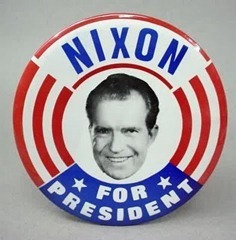 In 1972 while in high school I was in an advanced art class. One of our projects was to create an iconic & perhaps ironic picture of a contemporary personage. I teamed up with my partner to paint a matching set of religious iconography for Richard Nixon and Spiro Agnew. Together we painted an Agnew with a set of angel wings and a halo as well as a portrait of Nixon in front of an American flag billowing in the wind. I painted that portrait of Nixon, and I was happy to do so, because I was a Republican, and even thought I couldn’t yet vote, missing the vote due to my 18th birthday being a mere six weeks away from that Tuesday in November, I wanted Richard Nixon to win and wipe out that dastardly Hubert Humphrey.
In 1972 while in high school I was in an advanced art class. One of our projects was to create an iconic & perhaps ironic picture of a contemporary personage. I teamed up with my partner to paint a matching set of religious iconography for Richard Nixon and Spiro Agnew. Together we painted an Agnew with a set of angel wings and a halo as well as a portrait of Nixon in front of an American flag billowing in the wind. I painted that portrait of Nixon, and I was happy to do so, because I was a Republican, and even thought I couldn’t yet vote, missing the vote due to my 18th birthday being a mere six weeks away from that Tuesday in November, I wanted Richard Nixon to win and wipe out that dastardly Hubert Humphrey.
I voted the straight Republican ticket in 1974, an off-year, and then proudly voted for Gerald Ford. I tried to convince my friends voting for Carter that they were wrong to trust him, that Democrats were failures and weaklings, and that the Republican party was for Americans.
 Now, most of the people I knew were going to vote for Ford because I was living in Orange County, California. My U.S. Representative was “B-1 Bob” Dornan. My state representatives and senator were Republican (I can’t remember their names, but they had the “R” next to their names, so they were right and good.) But still—can’t leave anything to chance. So I supported the Republicans, passed out literature, and argued the case for the Republican Party with my friends, my co-workers, and even my boss.
Now, most of the people I knew were going to vote for Ford because I was living in Orange County, California. My U.S. Representative was “B-1 Bob” Dornan. My state representatives and senator were Republican (I can’t remember their names, but they had the “R” next to their names, so they were right and good.) But still—can’t leave anything to chance. So I supported the Republicans, passed out literature, and argued the case for the Republican Party with my friends, my co-workers, and even my boss.
I voted straight Republican in 1980, ‘84, ‘88, ‘92, ‘96, 2000, 2004, and 2008. I was a near-lifetime subscriber to the National Review. I ended up becoming a Precinct Committee Officer in my county, an appointive and an elected position, and walked the precincts for my federal and state elections, proudly supporting George H. W. Bush and even attending the state convention in Yakima.
I had sworn back in the 80s never to vote for John McCain, who, although a veteran of a terrible war, was a flawed senator with a small vision and some nasty viewpoints about people.
 And yet in 2008, I voted for McCain—breaking my vow—because I could not vote for Barack Obama. In my reasoning, Mr. Obama was untested and young and radical, and in my honest reasoning (which I never discussed with anyone) I knew he’d be a successful President, and I did not want a successful President if he was a Democrat.
And yet in 2008, I voted for McCain—breaking my vow—because I could not vote for Barack Obama. In my reasoning, Mr. Obama was untested and young and radical, and in my honest reasoning (which I never discussed with anyone) I knew he’d be a successful President, and I did not want a successful President if he was a Democrat.
I do not know what part racism played in this. Up until a few years ago, post-2008, I knew not a single person of color, but that was due to lack of effort on my part as well as lack of opportunity (opportunity which I created by my actions to keep myself separate). I just put this out there because I don’t know what part the “otherness” of Mr. Obama played in my decision, and if you look into your own mind you also understand it’s very hard to discern your true motives; often we make reasons up for why we choose to do what we do.
I argued strenuously against the Patient Protection and Affordable Health Care Act (a.k.a. “RomneyCare” and “ObamaCare”), doing whatever I could to support the delay and weakening of the act, both because it seemed untested and because it would give a Democratic President a feather in his cap.
Now, I could not imagine the life of anyone who’d support a Democrat, because they were the anti-life party, the party of higher taxes and broader welfare, the party of liberal social policies which would destabilize the Christian culture we had in America—you can fill it all in. I think I was a nice guy in general, but I didn’t want change. I wanted a strong America. I wanted an unruffled life.
I kept my loyalty through the years of Clinton when he managed the hat trick of a welfare change, of DOMA, and a successful conclusion to several armed conflicts that never developed into a national embranglement, but I could not give him credit for any movement to the Republican positions, because he was a Democrat.
I was happy to vote for George W. Bush, and was ecstatic when he finally won after the long recounts and court cases. (I still believe he won Florida, and still think he won his Supreme Court case fairly, but let that slide.) I was happy to see him win in 2004, and happy to see his response to the 9/11 disaster, a response which included more and more security features, tighter law enforcement controls, and two wars in Iraq and Afghanistan.
I was a “fiscal conservative” as well as a social conservative, and the spending under the Republicans seemed to zoom up and up and up, never really being cut, but going higher and higher. Whether tax rates should be punitive or corrective, I don’t know, but tax cuts were enacted that didn’t seem to really fix things. The Republicans gave lip service to social issues but spent more and more time on spending for wars and security as well as other spending projects. I could see no difference, really, in their behavior. They were involved in scandal after scandal, broken promise after broken promise.
But I was still faithful to the party.
When Mr. Obama won the nomination, I was unhappy. And when he beat Mr. McCain in an election which was by all honest accounts a sea change in the American cultural and political spheres, I knew there was little chance of my Republican Party being in charge soon. I was happy to hear Senator McConnell announce soon after the election that the goal of the Republican Party was to make Mr. Obama a one-term President, because dammit, Mr. Obama was a Democrat, and I was a Christian and a Republican, which were much the same thing.
Party labels were important, but I wouldn’t admit it.
In 2009 I began to make a series of changes in my life based upon issues which are not interesting here. But the important thing is that I was challenged by my circumstances and the people I had come to know to re-examine all my beliefs and assumptions, to look at what I truly valued, and then to ask myself if what I was doing with my life really matched my values.
I had chosen the Republican Party because I believed that people are important, are good and kind, and worth something, and I thought the Republican Party was like that, too.
But that party had shifted to become mean and divisive, crazy that a popular President was again making changes, doing whatever they could to stop him.
I could not face the fact anymore that my values as a person, as a man, as a Christian believer were being violated by the party which proclaimed itself the moral Christian party.
Well, I had stood it for a long time.
What made the break for me was simply this: that the Republican Party made an issue of Mr. Obama’s skin color and national origin. The drumbeat of “birtherism” started even before the November election, but it escalated over the next three years to the point where it became fully embraced by one Republican leader after another. Mr. McCain had the courage and courtesy to smack down a crazy lady who asked the senator to comment on Mr. Obama’s alleged foreign birth, but since that point in time the Republican Party leadership has seen this birtherism as a way to get their candidate into power, and they have run with it. Donald Trump, a genuinely crazy man, proclaims that Mr. Obama isn’t an American and is feted by the Republican Party; Mr. Romney himself, in a slap to his own father’s integrity, brings this up on national TV. It is disgusting.
I am sick of it all. I am sick of it that the Republican Party of my youth and early adulthood is the party that seeks to denigrate Mr. Obama with this trash, that it seeks to disenfranchise vast numbers of Americans because they vote for the Democrats, that they seek to simply let rich people buy their way into the White House—there is a litany of things which have made me sick—but the primary reason is this crap of birtherism.
The Republican Party has chosen to lie down with the most disgusting and crazy, mean and spiteful people in America—these privileged people who cannot stand that a black and a Democrat is in power—and they have earned my revulsion.
I am sorry I voted for McCain, but McCain is way ahead in integrity and honesty and even Christian behavior than these current Republicans.
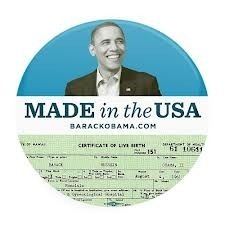 And I am proudly supporting and voting for Mr. Obama and every single Democrat I can think of. Because Democrats might not be perfect (and neither are Republicans), but they have not been so arrogantly vicious while proclaiming themselves the party of God. I am only one man, but I will do what I can.
And I am proudly supporting and voting for Mr. Obama and every single Democrat I can think of. Because Democrats might not be perfect (and neither are Republicans), but they have not been so arrogantly vicious while proclaiming themselves the party of God. I am only one man, but I will do what I can.
I have left the party I supported with my time, my money, my heart, and my loyalty. But really, I think they left me.
Sow the wind, and inherit the whirlwind.
October 24, 2012
Why I am NOT VOTING FOR Romney
Earlier I stated why I AM voting for Obama, and you can check my timeline for my reasoning.
Now I’ll say why I am NOT voting for Romney, but note that I am not voting AGAINST. I am simply going to give the reasons why Romney could not get my vote.
First, though, understand that I do not care about Romney’s religious beliefs—or Obama’s beliefs. We have a principle in America that with the free exercise of religion, that we don’t require belief in any specific church; in fact, we say a man can believe or not believe as he will and still be a citizen, an elected official, or even President.
What I DO care about, deeply, is that Christians are abandoning their core principles and theology in order to support Romney. I simply do not care at all that you support Romney and you are a Christian—that is your right. I DO care that Christians are abandoning their core theological beliefs about Jesus Christ in order to accommodate the religious beliefs of the Mormon church.
Like I said, that Romney is a Mormon is, to me, irrelevant and uninteresting. I’m not voting based upon a man sharing my religious beliefs, and as an American, I shouldn’t.
What I suspect is that a lot of Christians DO vote this way, and are trying to fit the Mormon theology into their own, and in doing so they are abandoning a core teaching about the nature of Jesus Christ. I’ve said elsewhere this is the most dismaying thing about Christians’ support for Romney. But this essay isn’t about that.
My reasons for not voting for Romney come down to the following principles:
* Romney’s action as a businessman have destroyed American businesses, American employees, and American lives
* Romney’s actions as a governor were ineffective, divisive, partisan, and reckless
* Romney statements as a candidate have been thoroughly unreliable, with every position on every issue being malleable depending upon the audience
* Romney’s core principles of action consistently revolve around core issue that overwhelming favor his own economic interests at the expense of all others
* Romney sees people as economic units and not as humans worthy of dignity and respect
Now let me develop my thesis:
ROMNEY’S ACTION AS A BUSINESSMAN HAVE DESTROYED AMERICAN BUSINESSES, AMERICAN EMPLOYEES, AND AMERICAN LIVES
It is no secret that Romney trumpets his business credentials, that he has made money. But he has done so by destroying working businesses, destroying the economics of ordinary people, and skimming the best from a company before abandoning it.
Take for example KB Toys, an ordinary business. Through a series of entirely legal methods, Romney and his company, Bain, came in with a very small amount of cash and a large amount of borrowed cash and gained control of KB Toys. (Entirely legal.) Once in charge, Romney and his company then loaded up KB Toys with an enormous amount of debt to pay back himself and his investors, then Romney and his company abandoned KB Toys to let it handle its new load of unnecessary debt. Romney and his company made off with hundreds of millions of dollars in essentially free money. KB Toys struggled for a few years, then collapsed. Hundreds of ordinary employees were then left without jobs, careers, or even the decency of a severance paycheck.
It’s well-known that Romney and his company has thrived by sending business overseas, which again is entirely legal.
But for a man who claims to be a job creator and someone who claims to want to create jobs, his actions have shown that he is much more interested in his own finances at the expense of ordinary people in America.
Remember, he is the one who urged Detroit to “go bankrupt,” which would have thrown thousands of employees out of work. The only ones to profit from that would be those who’d sweep in to consume the carcasses of the car makers. I leave it as an exercise to the reader who those people would be.
ROMNEY’S ACTIONS AS A GOVERNOR WERE INEFFECTIVE, DIVISIVE, PARTISAN, AND RECKLESS
Romney claims to have been a bipartisan governor are false. While he was governor, he vetoed over 800 bills submitted by the legislature, with nearly 90% of his vetoes being overridden, often by unanimous votes. This isn’t bipartisanship unless you think that Republicans and Democrats in the legislature voting to override his vetoes is bipartisan.
His signature accomplishment as governor, health care reform, was inserted into his official government portrait he paid for. It was the basis for the Patient Protection and Affordable Health Care Act (“Obamacare”) and yet he has run away from it because (in my opinion) it was proposed by the Democrats. An honest man would support his own creation even if it was supported by his political opponents; indeed, a leader would _use_ this to accomplish his goals. As Reagan himself said, “You can get a lot accomplished if you don’t want to take credit.” It’s my belief that Romney’s actions about his own health care plan show that he is unable to govern or to lead; indeed, that by opposing his own plan he is reckless with American lives and the American economy.
ROMNEY STATEMENTS AS A CANDIDATE HAVE BEEN THOROUGHLY UNRELIABLE, WITH EVERY POSITION ON EVERY ISSUE BEING MALLEABLE DEPENDING UPON THE AUDIENCE
On key issues, Romney has been both for and against, often changing positions from one extreme to another and back again, sometimes on the same day or within a few minutes.
It’s almost irrelevant to talk about the positions, but he has been both for and against abortion access, gay marriage, acting on climate change—you name it, he’s been for or against it.
Now, every good person would, upon gaining more information, change his mind. That’s understandable.
What’s not understandable is that he changes his stated beliefs so frequently in order to curry favor with his current audience.
His statement about the “47% who wouldn’t vote for him no matter what” is an example. To the rich white donors, he said, in effect, “I’m with you poor oppressed wealthy people against those lazy grifters and takers.” When it came out that he had been recorded, he changed his tune and said he was for “every American.”
I’d have more respect for a man who said simply, “Look, I can’t get every vote, and some people won’t vote for me no matter what” rather than “I never said that, meant that, and I was misquoted.”
Like the weather, if you don’t like a Romney position, wait a few moments.
It might feel good that he gets those digs in and changes his mind, but eventually, he’ll change his mind about you.
It won’t be so satisfying then, I’d imagine.
ROMNEY’S CORE PRINCIPLES OF ACTION CONSISTENTLY REVOLVE AROUND CORE ISSUE THAT OVERWHELMING FAVOR HIS OWN ECONOMIC INTERESTS AT THE EXPENSE OF ALL OTHERS
We hear that America is in an economic crisis. Spending seems to be out of control, and the free flow of cash in our economy is under attack. We can agree that unreasonable spending should be revisited, and we can disagree upon that.
But we have historic LOW rates of taxation. We have LOW inflation. We have a stumbling economy, an economy which is driven by consumer demand.
Romney’s reaction to this is to cut taxes further, especially taxes that favor his class, and especially the kinds of income earned by him and his friends. Romney’s tax cuts would inordinately reduce the taxation upon his friends, in some cases reducing the tax rate to zero.
Spending under his plan could not be cut enough to offset his tax cuts. The only place to go after the money needed to pay for his spending plan is to go to the middle class and the poor. It would increase their taxes AND their ability to spend. It would REDUCE consumer demand further.
It is simply beyond belief that people could think that they themselves, the middle class, should pay higher taxes in order to reduce the historically low tax rates upon the incredibly rich. This isn’t class warfare unless you think class warfare means to do what’s entirely not in your own economic self-interest in order to give rich people yet an easier tax burden.
There are so many cars and yachts and vacations you can buy in life. After a while, acquiring riches has no meaning.
But the reason people in America can get rich is that we not only reward hard work, we protect it and we provide a stable political, economic, and social structure which supports and rewards riches.
Rich people don’t get rich by themselves; they do so because they have the blessings of liberty and the protection of the state.
Paying for that—and paying more for that—is only right. You got rich because America provided a place to get rich. Now you must pay for that.
For an example of a place that lets you get rich but does not provide the stable economic political, economic, and social structure to create a free and open society, check out India. There are wealthy people there, and there is incredible poverty, often within a few feet of each other.
The reason we have a stable society and culture in America is because we expect everyone to pay their fair share and to contribute to the general welfare of society.
It makes no sense to expect poor people to pay more so rich people can have it just a bit easier. Very few people who are poor are poor because they don’t work hard enough or don’t contribute enough. Asking them to pay more is simply irresponsible, mean, and greed.
ROMNEY SEES PEOPLE AS ECONOMIC UNITS AND NOT AS HUMANS WORTHY OF DIGNITY AND RESPECT
As with the previous point, people have certain rights and have value outside of their economic value. People in America struggle to find jobs, find good education, find hope and support—they work hard and they expect to be rewarded. They are more than what they can produce economically, and they have value even when they cannot contribute. That’s what being “pro-life” is.
Romney’s plan not only does not value human life, it grinds poor people even further into poverty. Romney’s plans would cut the things that make it easier to be poor in America—it cuts spending on social programs such as education or health care or pensions or social security—in order to give rich people more money and to increase the spending on government programs that unduly reward his supporters, such as increased military spending. (America has a larger armed forces than the next 25 nations combined—and some 24 of those nations are our allies. Who exactly are we going to need such armed forces for?)
Grants and loans for colleges would be cut or eliminated. Education is the key way to overcome poverty and to get a middle-class or higher lifestyle, but the Governor would cut these programs.
Social Security and Medicare are on the chopping block. There are key reforms that could be made to save or extend the life of these programs, such as simply reducing the cap on Social Security taxes so that rich people simply *start* paying taxes on their income over $115K.
We have roads and bridges which are falling apart. We have a 19th Century water supply system. We have railroads which are hobbled by old technology. We have desperate need for 21st Century transportation solutions, solutions which would help ordinary workers get to their jobs with less stress and in more comfort, with less effect upon the environment.
Instead of promoting the general welfare, however, Romney’s plans would simply reward the already rich with more riches. Romney’s plans would let rich people pay even *less* in taxes.
Under Eisenhower (a Republican) we had some of the highest tax rates. I don’t think we need to go back to those tax rates. But we also started the Interstate Highway System. We built out the roads and transportation systems we still use today. We had not only the government we needed to build the most successful economy in history, we had the *will* to do so. We believed government was good, and that ordinary people mattered, and that rich people should simply pay their share.
We are still asking for the same thing. That government is good. That people matter. That rich people should pay their fair share for the blessings they have acquired due to the efforts of ALL America .
We believe that people matter, that they have worth, and that they simply DESERVE our respect and support. We believe that people who are poor or disadvantaged can not only use our help, but they can expect it. We also believe that personal charity is important, but that in many cases individuals cannot do what the government can do.
Romney’s plans simply do not include support for ordinary people. Romney’s plans do nothing to make the lives of ordinary people stable or successful. Romney’s plans destroy the ability of people to advance in life because his plans destroy access to affordable health care and education.
Now, Mr. Romney is probably not a bad man. He appears to be loved by his family and friends.
But whether he is likable or not, good-looking or not, successful or not, he is simply a disastrous choice for President, and while I am not voting *against* him, I find no reason to vote *for* him, because everything he stands for and everything he wants to do runs directly against my values and principles and hopes.
I urge every voter to think not which candidate looks best or sounds best, or even which “feels” best, but to think long-term, what is best for them and for America.
October 22, 2012
Why I Am Voting FOR Barack Obama
I’m a life-long Republican, voting in my first election in 1974, and since 1976 I have voted the straight Republican ticket. I’ve served as a Precinct Committee Officer, and I’ve served as a delegate to my state convention in 1992. I was proud of my Republicanism, and kept voting the straight ticket through 2010. I loved God and family and flag, and no Democrat ever would protect all three.
In 2008, I voted for my last Republican presidential candidate. Against all my feelings and judgment, I held my nose and voted for Senator McCain, a man who served his country honorably in Vietnam, but who was part of a political corruption scandal in the 80s, and someone who was erratic and undependable. I voted for him because first of all I’m a Republican, and I vote for the Republican, but I really, really could not stand him. I felt he was unprincipled and dishonest, mendacious and petty, intemperate and foolish. I had said for years I would never vote for McCain, and yet in 2008 I broke my principled objection to him and voted for him.
But the other guy was Senator Obama, a man who’d never held an executive position, a man with several autobiographies by the age of 45, a man who seemed to be simply way, way too liberal for me. He seemed to be only an outsider and a favored man who made silly mistakes when campaigning, a man who inspired others but who appeared flat and dull to me. Plus, I was really tired of the Black Jesus approach to him by his supporters. Since I believe in the true Jesus, it offended me to see Sen. Obama elevated with such glamor. Really, guys. He’s only a Senator.
I will say I was glad to see McCain lost, but I wasn’t happy Obama won. And for the first 18 months of his Administration I saw no good in what he did, and was glad that the Republicans pulled every trick in the book to thwart him.
But then he proved to be an adept President, focusing on the immediate tasks (saving the economy from collapse) and long-term objectives (bringing about changes to the health care system in the U.S.). The greatest economic downturn since the 1930s hit, and he and his team worked to ameliorate the results and to revive the economy. It’s not great, but it’s much better. We all know this, even Republicans. We are better off now than we were the month Obama took office, and saving General Motors was the right thing.
He proved to be adept at foreign policy and military outcomes, correctly deciding to take the U.S. out of Iraq and correctly deciding to take the U.S. out of Afghanistan in 2014–12 years is long enough for a war. He correctly pursued the reason we started this war in the first place, keeping the military on task to capture and kill Osama bin Laden.
He proved adept at getting health care reform through Congress over the incredible efforts of the Republicans to oppose him and his party. Not everyone likes it, but for me, it proved to be a wonderful blessing. My premiums have risen at the slowest rate in years, we got a refund, and my kids have been able to stay on my health care plan, saving us as a family thousands of dollars a year.
So after the elections of 2010, I began to re-examine my beliefs. Why was I so opposed to the man who initiated and led these efforts and changes? Why was I so opposed? The only reason I could think of was because he was a Democrat.
But I’m an American, and so is he. (In fact, the birther nonsense that still is part of the Republican message is what pushed me over the edge. You people who believe President Obama is a Muslim or is a Kenyan are simply insane. There’s no way to put it delicately.) I believe in America. So does he. I believe in the Constitution. So does he.
I looked at what he _did_ and who he _was_, and I decided in 2011 to stop opposing my best interests and to stop being afraid to do what was right for me and for my country, and I began to support President Obama.
He is the President of all Americans, and he is the President for all Americans. Because of his leadership we left Iraq, we are leaving Afghanistan, we are seeing more jobs, we are seeing an economic recovery, we have a new, national health care system, we have met the primary objective on the War on Terror–he and his team of supporters have accomplished this.
So I’m voting for him for the first time. For the first time in my life, I am voting for a Democrat for President, because he has earned my trust and he has earned my vote.
Congratulations, Mr. President, on your re-election.
One day I’ll explain why I left the Republican Party. But this is about why the Democrats have earned my trust.
October 21, 2012
Losing My Religion–Pt 6
Monty spoke today on faith, about how it’s the possession of what’s unseen, that it’s a race where there are crowds at the beginning and the end but the long middle is where you spend most of your time. And that got me thinking about what faith means in the life of a believer. 
Sometimes I think faith is what I feel—that inner assurance that all is well, that I’ve checked the boxes and am guaranteed of a result, that I’ve been saved and redeemed and now I’m living a life of total victory. (The last part? Well, I can hope…)
But faith really isn’t that feeling. It can be, and thank God sometimes it is, but it’s not that entirely. Faith really is the assurance of your journey.
Suppose, for example, you walk to a door and open it, and the room is dark. What’s the first thing you do? You flip the light switch, and there is light. But Edison, a man we often recognize as the inventor of the ordinary light bulb, started from darkness. To make light; he failed 10,000 times; he only succeeded the 10,001st time. He kept on going because he believed that what he was doing would result in light, though it didn’t happen until the very end. His faith at the start kept him going. His faith was, at times, a very real feeling, and at times a lonely journey.
Dr. King, a man we recognize as revolutionizing the concept of America, kept going on because he had a dream, and he spoke and struggled and worked to accomplish that dream; in the end he almost saw the achievement of his work. All those years of speaking and working and struggling came by faith, not by feeling successful. There were many moments of loneliness and failure along the way, many times of division and doubt, times when he was beaten or jailed simply for speaking and believing, but he kept on going because he believed.
Now, I don’t put myself into that pantheon of faith-heroes. I can only tell you my story of faith, my journey, and how I’ve kept going on faith.
When I started my journey I was convinced I would be a history teacher wearing a coat with leather patches on the sleeves and holding a pipe while lecturing students. My actual journey has taken many twists and turns, and there have been many failures and moments of doubt. But all along, my faith has kept me moving along, trying new things, and continually using my talents and strengths. Today I’m in an industry that didn’t exist when I started, working on systems for a worldwide information structure that arose only in the 21st century, in a world I simply could not imagine even on my most fantastic days of dreaming. I began my journey in faith, not knowing how it would work out, but convinced that God would guide me and help me along the way.
My faith wasn’t always a feeling, and there have been moments I sat down by the river for hours just to think about what I was doing and how I’d support my family. But God has been faithful to open doors and, when necessary, to push me out of windows when I wouldn’t go through the doors he opened before me.
I can look back now and realize that faith has pushed me and sustained me and even strengthened me. I have truly believed in what I was doing and what I could accomplish, even when it didn’t exist.
“I believed and therefore I spoke,” the scriptures say, implying that when you believe, you act, almost uncontrollably, because your faith impels you to act. You have to do what you do because you believe.
That’s what faith is—the inner drive that pushes you to work out your life, to build out your dreams, to proclaim and walk in your hopes.
Yes, it’s a feeling at times of comfort, but really, it’s that part of you that is convinced that you’re doing the right thing, that it’s all going to work out, that in the end you’ll achieve what you set out to do.
And faith as a believer in Jesus is the same. We have faith because we believe what he said and did is true. We act because we know that we will succeed. We live and move and breathe in faith, knowing that God is there for us, and in the end will receive us into his kingdom.
If you are not sure where you are on your life’s journey, or think you’ve lost the way, or even think you’re stuck in failure, I urge you to talk to someone here at SVA. We’d be happy to help you find strength and assurance and, yes, even faith.



